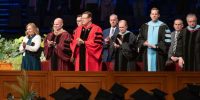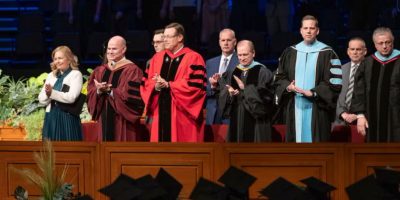Put bluntly, I found the recently published “Latter-day Saint Radical Orthodoxy: A Manifesto” heartbreaking. Not because it does or does not take a particular position; rather, my pangs arise from the fact that it exists at all. There are already too many “camps” in the LDS Church, and with the Radical Orthodoxy Manifesto, and the organized, aggressive thought-influencing campaign that is accompanying it, there is now yet another faction that threatens further balkanization of LDS church membership.
In Fourth Nephi, we get a picture of what life could be like if everyone was “converted unto the Lord.” Says Nephi:
“There were no contentions and disputations among them, and every [person] did deal justly one with another. And they had all things common among them; therefore there were not rich and poor, bond and free, but they were all made free, and partakers of the heavenly gift. … There was no contention in the land, because of the love of God which did dwell in the hearts of the people … and surely there could not be a happier people among all the people who had been created by the hand of God. There were no robbers, nor murderers, neither were there Lamanites, nor any manner of -ites; but they were in one, the children of Christ, and heirs to the kingdom of God (4 Nephi 1: 2-3, 15- 17).
This description resonates with what we know about the City of Enoch, in which “they were of one heart and one mind, and dwelt in righteousness; and there was no poor among them”—what the Lord called “Zion” (Moses 7:18).
I do not believe that all individuals described in Fourth Nephi or Moses saw the world, or even the Gospel, in the exact same way. How could they? Each person is eternally and profoundly unique, and each person’s life experience is distinctive to that individual. Rather, in Fourth Nephi and Moses we get a description of people who did not allow their God-given uniqueness to result in factions. In fact, consistent with Paul’s writings, what these groups figured out is that it is from this variety of experience and perspective that the Body of Christ draws its strength (1 Cor 12:12-27). But this is a lesson that is easily put aside.
The greatest challenge is balkanization within the Church.
In my estimation, polarization with ‘the world’ (i.e. the LDS faithful versus the secular faithless) is not the LDS Church’s greatest challenge—Latter-day Saints have proven resilient in the face of external opposition. The greatest challenge is balkanization within the Church. Balkanization is the breaking down of a larger group into smaller groups. At its most benign we see balkanization in the rise of various pop-culture niches into which individuals self-select; at its most traumatic we see balkanization in the dissolution of nation-states and the formation of mutually hostile groups (such as what occurred with the fall of Yugoslavia and the ethnic conflict which arose). My sense is that there is an increasing balkanization of church membership, as individual members self-select into in-person and virtual groups that each argue for their own claims on the “right” position/approach to Gospel belief and living, to the exclusion of other positions. To extend (perhaps too far) Paul’s analogy, in our church it is, increasingly, the fingers banding together and asserting that the finger-y view of the Gospel is most legitimate, while the toes, the elbows, and the ears similarly organize and stake out different, and equally strong, positions against the others. Rather than each group seeing itself as part of the whole, the process of balkanization is driving wedges between groups. A body could not survive that way, and neither can our church.
On its face, the Radical Orthodoxy Manifesto seems to be an attempt to fight balkanization. It tries to split the difference between conservative (orthodox) and liberal (radical) views and toward unity. I appreciate the intention behind this effort, and its attempt to bring people together. But, even if well-intentioned, I would argue the practical outcome of the Manifesto is, in reality, simply more balkanization. While reaching for a middle-way, the Manifesto has only created another-way.
Although there are meaningful differences in kind, I see real similarities between the Radical Orthodoxy Manifesto and Boyd K. Packer’s now-infamous statements about the dangers of the gay-lesbian and feminist movements and of the challenge of “so-called” intellectuals and scholars, because both the Manifesto and Packer’s statements serve to create “-Ites” within the Body of Christ. Some -ites are bad (as Packer asserted when it comes to gay-lesbian-ites, feminist-ites, and intellectual-ites) and some are good-but- inadequate (as the Manifesto asserts when it comes to liberal-ites and conservative- ites) and some are good (as the Manifesto says of its newly-minted Radical-Orthodoxy- ites). But, no matter how one looks at it, both the Manifesto and Packer’s statement, foundationally, serve to factionalize the Body of Christ. They both force members to pick sides and align with a specific version of Gospel living and understanding. They both lead to balkanization in the Church.
The Manifesto actually invites additional balkanization.
Perhaps more problematic, however, is the Manifesto actually invites additional balkanization in the future. For example, is not hard to imagine a series of counter- manifestos spawning—conservative, liberal, or even one advocating for “Conservative Heterodoxy.” Just a cursory view of responses to the Manifesto makes clear, the Manifesto is already becoming a wedge that is dividing members further into ever- smaller ideological camps. The fact that the Manifesto’s release has been accompanied by a well-organized (apparently pre-planned) and intentional advocacy campaign of ‘Mormon famous’ influencers will only amplify its factionalizing effect, particularly with those who see themselves in the most conservative and most liberal camps.
Fred Rogers once observed, “You are a very special person. There is only one like you in the whole world. There’s never been anyone exactly like you before, and there will never be again.” And God’s plan for humankind embraces the radical individuality of each person’s life’s journey: Everyone, “one person at a time, one covenant at a time” comes to God. Rather than spending time trying to delegitimize one view of the Gospel or to validate/advocate for another—actions which are simply different sides of the same coin and both of which come with collateral damage no matter how well- intentioned—the best hope to for building Zion is to finally, fully accept that each one of us is on our own path, to humbly seek to teach and learn from each other, and trust our eternal parents will be merciful and just and account for the unique contours of our lives when we meet them again.
This does not mean we avoid interaction or stop sharing our perspectives and insights. In fact, it is in the friction of our interactions that the fires of faith are started and fanned into life as we learn from the experiences of our brothers and sisters. And this does not mean that there are no guideposts. Jesus has been quite clear about what constitutes His Gospel (see, for instance, 3 Nephi 27:13-21). But we must also acknowledge that our own perspectives and insights are inherently limited. We must acknowledge that gospel guideposts necessarily leave room for individual application for agency to have any meaning. And we must acknowledge that, in the end, each of us is ultimately accountable to God for the path we walk. Rather than developing manifestos or organized ideological campaigns that seek to draw people to our ideas, we must share our ideas in the marketplace of faith as we embrace “the fundamental holiness of diversity.”
Jacob, Nephi’s younger brother, beautifully notes, “Come unto the Lord, the Holy One. Remember that his paths are righteous. Behold, the way for [humankind] is narrow, but it lieth in a straight course before [them], and the keeper of the gate is the Holy One of Israel; and he employeth no servant there” (2 Nephi 9:41). Jesus is my gatekeeper, and he is your gatekeeper. No human, no idea, no institution can take that role. Jesus employs no servants at the gate. So rather than quibbling over whether one person’s experience with the gospel is better (or more right or more true or more straight or more narrow) than another’s, going back to Paul, we need to let fingers be fingers and toes be toes and appreciate each for what they are without trying to make them something different. We need to do develop the “mind of Christ” (1 Cor 2:16) with the “image of God engraven upon [our] countenances” (Alma 5:19). We need to lift those around us to the best of our ability, seek truth from all we meet, love God and love our neighbor, and trust in the Holy One of Israel. In short, we need to actualize the vision of individual people who each individually are doing their best to come to know God and his Son
(John 17:3) but who are also joined in a community mutual respect and acceptance—a body in which there are no -Ites.

















